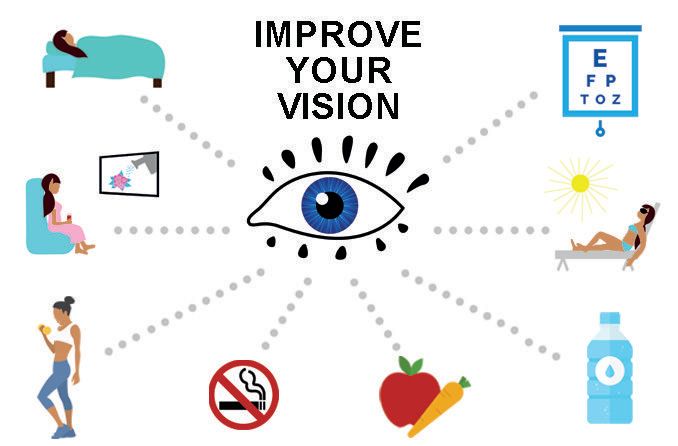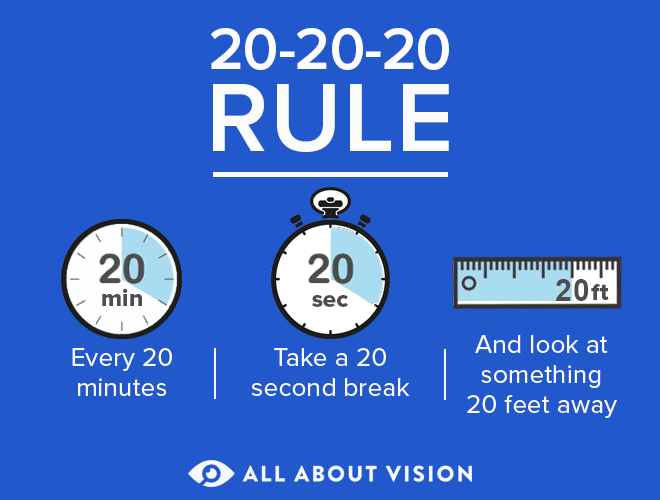Ways on how to improve vision

How can you improve your vision?
Making it a priority to focus on your health is the most important thing you can do to improve your vision.
Our eyes are just another part of our bodies. And like our other body parts, systems and organs, our eyes benefit from mindful maintenance and a healthy lifestyle.
Taking a few simple steps, like keeping up with routine eye exams, eating well and getting enough rest, can maximize your vision today and reduce the risk of eye disease in the future.
Here are 8 ways you can improve your vision:
1. Get an eye exam
Many people don’t realize they need vision correction until they’ve been experiencing blurry vision and headaches for months or even years.
The most common cause of blurry vision is a one or a combination of the four main refractive errors: nearsightedness, farsightedness, astigmatism and presbyopia. All four vision conditions can be treated with corrective eyewear that can be prescribed easily after an eye exam with your local eye care specialist.
If you’re already wearing glasses or contact lenses and still experience blurry vision, an outdated eye prescription could be to blame — another simple fix with a visit to your eye doctor. Your eye doctor also will check for any possible issues outside of refractive error.
READY TO BOOK AN EYE EXAM? Find an eye doctor near you to schedule an appointment.
2. Take frequent screen breaks
Too much uninterrupted screen time can lead to dry eyes and digital eye strain, resulting in temporary blurred vision and difficulty focusing.

The American Academy of Ophthalmology urges abiding by the “20-20-20” rule: For every 20 minutes of screen time, focus your eyes on an object at least 20 feet away, for 20 seconds.
You also can avoid or reduce symptoms of computer vision syndrome by decreasing the amount of time you spend looking at a digital screen. Staying mindful of how often you’re blinking can reduce dryness and improve vision during computer use.
3. Maintain an eye-friendly diet
Many foods benefit our eyes, but some offer a significant boost to vision quality and health, both short-term and long into the future.
Vitamin A: Well known for one eye-friendly food: carrots — but it’s also readily available in sweet potatoes and spinach. Additionally, increasing zinc consumption can help with vitamin A absorption.
Vitamin E: You can find vitamin E in whole-grain cereals, certain nuts (like almonds and hazelnuts) and, again, spinach. Increasing selenium in your diet can aid vitamin E absorption.
Other antioxidants: Blueberries, artichokes and “real” dark chocolate with high cocoa content are among the foods rich in antioxidants. Lutein and zeaxanthin are particularly eye-friendly antioxidants, and have been proven to reduce the risk of developing diabetic retinopathy and certain disorders like age-related macular degeneration. Lutein and zeaxanthin are found in many leafy greens.
Omega-3s: These fatty acids can reduce the effects of dry eye, an increasingly common cause of blurry vision. The most beneficial omega-3s, EPA and DHA, are heavily concentrated in coldwater fish like salmon, mackerel, herring and tuna. Eating fish at least twice a week is often recommended to ensure adequate omega-3 intake.
And the best part about eating these eye-friendly foods? They’ll benefit countless other parts of your body, too.
SEE RELATED: Can I improve myopia if I eat carrots everyday?
4. Quit smoking
Smoking increases the risk of developing certain vision disorders and even blindness. Also, smokers are twice as predisposed to dry eye syndrome as non-smokers.
According to the New York State Department of Health, smoking sharply increases the odds of developing age-related macular degeneration, cataracts, glaucoma and diabetic retinopathy.
SEE RELATED: How smoking harms your eyes (with printable PDF)
5. Get enough sleep
There aren’t many parts of our bodies that don’t function better with more sleep. Our eyes are no exception.
Sleep deprivation can lead to tired, dry eyes and blurred vision. Whereas adequate sleep gives our eyes a much-needed break from having to constantly focus and allows them to stock up on tears and rehydrate.
The Centers for Disease Control and Prevention (CDC) recommends a minimum of seven hours of sleep for adults aged 18 to 60, seven to nine hours for adults aged 61 to 64, and seven to eight hours for adults over 64 years old.
6. Drink enough water
Eyes can get dry, scratchy and uncomfortable when they don’t have the water supply to produce enough lubrication, including natural tears. Again, this problem continues to grow as screen use rises.
The National Academy of Sciences sets optimal, daily water intake at around 2.7 liters for women and 3.7 liters for men. This includes combined fluids from either drinks or food. But note that your exact water intake needs depend on factors like age, weight and physical activity.
7. Wear polarized sunglasses during the day
Sunglasses not only protect your eyes from the sun's harmful ultraviolet waves, polarized shades can temporarily improve your vision.
Wearing polarized sunglasses reduces or eliminates much of the glare associated with sunny days, which in turn keeps you from having to strain your eyes to see clearly. In the right situation, polarized sunglasses' haze- and reflection-busting capabilities will almost make it seem as if you’ve supercharged your vision.
SEE RELATED: What are the advantages of polarizes sunglasses?
8. Exercise regularly
Exercise, which is so clearly good for all other aspects of health and well-being, also appears to benefit our eyes.
Research increasingly suggests that physical activity could play a role in the prevention of eye diseases like cataracts, glaucoma and age-related macular degeneration. Exercise also can reduce the risk of developing diseases like type 2 diabetes, which can lead to vision-threatening complications down the road.
Specific “eye exercises” however, seem much less beneficial.
Eye exercise programs occupy a nebulous space somewhere between medical science and folk remedy. Most optometrists and ophthalmologists are dismissive of eye exercise programs that promise you can "throw away your glasses" due to lack of scientific proof of their effectiveness.
Instead, focus on proven, healthy eye and lifestyle habits to give yourself the best chance of maintaining clear vision that lasts a lifetime.
READ NEXT: 8 tips for healthy eyes
Page published on Thursday, March 5, 2020






